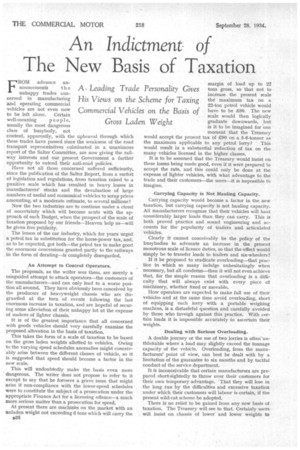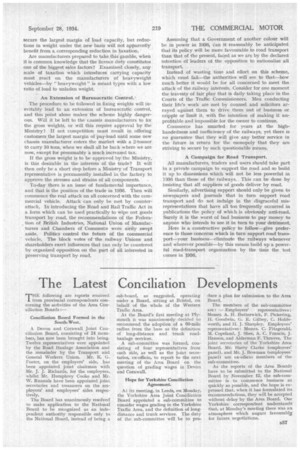An Indictment of
Page 46

Page 47

If you've noticed an error in this article please click here to report it so we can fix it.
The New Basis of Taxation
FROM advance announcements t h e unhappy trades concerned in manufacturing and operating commercial
vehicles are not even now to be left alone. Certain well-meaning people, usually the most dangerous class of busybody, not content, apparently, with the upheaval through which these trades have passed since the weakness of the road transport representatives culminated in a unanimous report of the Salter Committee, are now giving the railway interests and our present Government a further opportunity to extend their anti-road policies.
Have not all those concerned suffered sufficiently, since the publication of the Salter Report, from a surfeit of legislation and regulations, from taxation raised to a punitive scale which has resulted in heavy losses in manufacturers' stocks and the devaluation of large numbers of useful and economical vehicles to scrap prices amounting, at a moderate estimate, to several millions?
Now the two industries are. to continue under a cloud of uncertainty which will become acute with the approach of each Budget, when the prospect of the scale of taxation proposed by our friends—Heaven help us—will be given free publicity.
The lesson of the car industry, which for years urged a petrol tax in substitution for the horse-power tax, and, as to be expected, got both—the petrol tax to make good the enormous concessions granted partly to the railways in the form of derating—is completely disregarded.
An Attempt to Control Operators.
The proposals, as the writer sees them, are merely a misguided attempt to attack operators—the customers of the manufacturers—and can only lead to a worse position all around. They have obviously been conceived by the producers of heavyweight chassis who are disgruntled at the turn of events following the last enormous increase in taxation, and are hopeful of securing some alleviation of their unhappy lot at the expense of makers of lighter chassis.
It is of the greatest importance that all concerned with goods vehicles should very carefully examine the proposed alteration in the basis of taxation.
This takes the form of a scale of taxation to be based on the gross laden weights allotted to vehicles. Owing to the varying speed schedules anomalies might conceivably arise between the different classes of vehicle, so it is suggested that speed should become a factor in the new scale.
This will undoubtedly make the basis even more
• dangerous. The writer does not propose to refer to it except to say that he foresees a grave issue that might arise if non-compliance with the lower-speed schedules were to constitute the subject of a prosecution under the appropriate Finance Act for a licensing offence—a much more serious matter than a prosecution for speed. At present there are machines on the .market with an unladen weight not exceeding 6 tons which will carry the sad margin of load up to 22 tons gross, so that not to increase the present scale thd maximum tax on a 22-ton petrol vehicle would have to be 2,90. The new scale would then logically graduate downwards, but is it to be imagined for one moment that the Treasury would accept the present tax of 290 on a 5-6-tonner as the maximum applicable to any petrol lorry? This. would result in a substantial reduction of tax on the many vehicles licensed in the higher classes.
It is to be assumed that the Treasury would insist on these losses being made good, even if it were prepared to accept the rate, and this could only be done at the expense of lighter vehicles, with what advantage to the trade and their customers—the users—it is impossible to imagine.
Carrying Capacity is Not Hauling Capacity.
Carrying capacity would become a factor in the new taxation, but carrying capacity is not hauling capacity. All manufacturers recognize that their vehicles will haul considerably larger loads than they can carry. This is both proved practice and sound engineering and accounts for the popularity of trailers and articulated vehicles.
Clearly it cannot conceivably be the policy of the busybodies to advocate an increase in the present monstrous scale of licence duties, so that the effect would simply be to transfer loads to trailers and six-wheelers?
If it be proposed to eradicate overloading—that practice in which so many indulge unhesitatingly when necessary, but all condemn—then it will not even achieve that, for the simple reason that overloading is a difficulty that will always exist with every piece of maChinery, whether fixed or movable.
How operators are expected to make full use of their vehicles and at the same time avoid overloading, short• of equipping each lorry with a portable weighing machine, is a distasteful question and carefully avoided by those who inveigh against this practice. With certain loads it is impossible accurately to ascertain their weights.
Dealing with Serious Overloading.
A double journey or the use of two lorries is often un thinkable where a load may slightly exceed the tonnage capacity of the vehicle. Overloading, from the manufacturers' point of view, can best be dealt with by a limitation of the guarantee to six months and by tactful conduct of the service department.
It i inconceivable that certain manufacturers are prepared short-sightedly to throw over their customers for their own temporary advantage. That they will lose in the long run by the difficulties and excessive taxation under which their customers will labour is certain, if the present wild-cat scheme be adopted.
There is no relief to be gained from any new basis of taxation. The Treasury will see to that. Certainly users will insist on chassis of lower' and lower weights to secure the largest margin of load capacity, but reductions in weight under the new basis will not apparently benefit from a corresponding reduction in taxation.
Are manufacturers prepared to take this gamble, when it is common knowledge that the licence duty constitutes one of the biggest sales factors? Examined closely, any scale of taxation which introduces carrying capacity must react on the manufacturers of heavyweight vehicles—by " heavyweight " is meant types with a low ratio of .load to unladen weight.
An Extension of Bureaucratic. Control.
The procedure to be followed in fixing weights will inevitably lead to an extension of bureaucratic control, and this point alone makes the scheme highly dangerous, Will it be left to the cnassis manufacturers to tix the gross weights, or will this require approval by the Ministry? If not competition must result in offering customers the largest margin of .pay-load until some new chassis manufacturer enters the market with a 2-tonner tO carry 10 tons, when we shall all be back where we are now., except for presumably .a much increased tax.
If the gross weight is to be approved by the Ministry, is this desirable in the interests of the trade? It will then only be a short step before a Ministry of Transport representative is permanently installed in the factory to approve the stresses and strains of all components.
To-day there is an issue of fundamental importance, and that is the position of the trade in 1936. Then will commence the real attack on all concerned with the commercial vehicle. Attack can only be met by counterattack. In introducing the Road and Rail Traffic Act in a form which can be used practically to wipe out goods transport by road, the recommendations of the Federation of British Industries, National Union of Manufacturers and Chambers of Commerce were airily swept aside. Politics control the future of the commercial vehicle. The block votes of the railway Unions and shareholders exert influences that can only be countered by organized opposition on the part of all interested in preserving transport by road.
Assuming that a Government of another colour will be in power in 1936, can it. reasonably be anticipated that its policy will be more favourable to road transport than that of the present, faced as we arc by the declared intention of leaders of the opposition to nationalize all transport.
Instead of wasting time and effort on this scheme, which must fail—the authorities will see to that—how much better it would be for all concerned to meet the attack of the railway interests. Consider for one moment the travesty of fair play that is daily taking place in the Courts of the Traffic Commissioners. Men conducting their life's work are met by counsel and solicitors arrayed against them to chive them out of business or cripple or limit it, with the intention of making it unprofitable and impossible for the owner to continue.
Commerce has smarted for years at the highhandedness and inefficiency of the railways, yet there is no guarantee that they will give any better service in the future in return for the monopoly that they are striving to secure by such questionable means.
A Campaign for Road Transport.
All manufacturers, traders and users should take part in a private campaign to support the road and so build it up to dimensions which will not be less powerful in 1936 than those of the railways. This can be done by insisting that all suppliers of goods deliver by road.
Similarly, advertising support should only be given to newspapers and journals that in turn support road transport and do not indulge in the disgraceful misrepresentations that have all too frequently occurred in publications the policy of which is obviously anti-road. Surely it is the worst of bad business to pay money to anyone who intends to use it in turn to your detriment.
Here is a constructive policy if) follow—give preference to those concerns which in turn support road transport—your business—eliminate the railways whenever and wherever possible—by this means build up a powerful road-transport organization by the tinie the test comes in 1936.




















































































